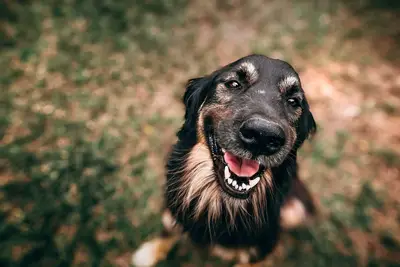Why do dogs ignore mirrors? Do dogs even understand their reflection in a mirror? I realized I didn’t know the answer to those questions when I watched our Australian Shepard, Juno, catching a glimpse of her reflection. She stared at herself for just a little bit, but didn’t seem too overly excited. This happened in the first few weeks of getting her. Now, she doesn’t seem to care at all. Why does she now ignore the mirror and her reflection?
It’s thought that dogs ignore mirrors because they lack self-awareness, meaning dogs don’t understand that the reflection is them. Since dogs rely the most on scent, it is more likely that a mirror is simply not that interesting.
The concept of self-awareness in your dog is probably better worded as a “sense of self”. While dogs may not spend hours pondering their existence and purpose in the universe (as humans do), dogs at least understand they exist. Let’s take a deeper look at this idea and the evidence. It’s actually quite interesting, especially the “Yellow Snow Test”. No, not the snow cone kind.
The Reason Your Dog Ignores the Mirror
There tends to be a popular opinion that dogs ignore a mirror just because they lack the self-awareness that humans have. While that is certainly true, there is also some evidence that dogs have a limited sense of self. This is the main point that everyone argues about.
Self-awareness: humans vs. dogs
Human Self-Awareness
Anyone who has spent time around infants know they’re fascinated by mirrors. They will spend a lot of time starring, giggling, or smacking the mirror. Those diaper wearing – pudge balls are just so darn interested in their own reflection. In the beginning they’re not even aware it is a mirror – they just think another baby is starring at them. Eventually this fades away and self-awareness starts to creep in.
Somewhere between one and a half to two years old self-awareness is established and that tiny human now instantly knows they’re looking at themselves. This is considered one of the most impressive forms of consciousness.
It’s hard for me to compute that my three year old, starring at himself in the mirror while second knuckle deep in his nostril, is somehow sophisticated consciousness. However, according to science, it is.
While dogs certainly don’t have the same level of self-awareness, they do possess some understanding of self.
Dog Self Awareness
Like infants, puppies tend to be interested in a mirror early on. You may notice your puppy barks, growls, or even play bowing to “the other puppy in the mirror”. Also like babies, at some point in their development puppies lose this fascination with a mirror.
With that said, there are some dogs with obsessive tendencies, that may not outgrow barking or growling at the mirror.
However, there is supporting evidence that dogs posses some understanding of self as they mature. This is demonstrated by actions and behaviors that show a concept of “mine” vs. “others”. Simply put, dogs understand what belongs to them: their territory, their pack, their food, their toys, etc. They also understand what belongs to others.

This is obviously not to the same extent as humans, but dogs know they exist in the world and move around in it.
Dogs care more about smells than their reflection
Another thing to consider in evaluating why dogs ignore mirrors comes down to what sense is their primary force for navigating the world.
For humans and other primates, sight is the most important sense. We heavily rely on sight to understand the world around us. We also carry the vanity of caring about our appearance (umm…exhibit A: the selfie obsession).
Humans spend long amounts of time in the mirror making sure they look like the cover of magazine or judging their body and facial features. Don’t lie – we both know you’ve spent time watching your self flex or sucking in your stomach.
Well, first of all, dogs just don’t share that same level of vanity that humans and primates have. I know for a fact none of my dogs care how goofy the looked, no matter what they’re doing.
Secondly, dogs rely on their sense of smell way more than they rely on their sense of sight. Scent gives a dog a better, fuller picture of their place in the world, rather than the view of a mirror.
It’s these two points that lead people to believe that dogs may recognize their own reflections, but they just don’t really care about it.
The Yellow Snow Test
In a short article on ScientificAmerican.com, Marc Bekoff, a Biologist at the University of Colorado Boulder, says that dogs possess at least an understanding of their place in the world.
To show this, Bekoff preformed a traditional self-awareness test with a twist geared towards dogs. Instead of the traditional Red Spot Test (also known as the Mirror Test), Bekoff preformed what he calls the “Yellow Snow Test”.
The Red-Spot test is basically where an odorless dot is placed on an animal’s head without them knowing. Then, if the animal reacts to the dot and tries to touch it, or remove it, the animal is deemed to have self-awareness.
Bekoff explains that he felt that the Red Dot Test, which was based on sight, was not the best setup to test self-awareness in a dog. How could a test that relies on sight properly gauge an animal who relies the most on sense of smell?
So, in an attempt to address that gap, Bekoff came up with the idea for the “Yellow Snow Test”.
Over the course of five winters, Bekoff collected snow that his dog had peed on and then placed that snow along their walking path without his dog knowing. Bekoff made sure that it was random and that his dog was unaware of his actions. The intent was to see if Bekoff’s dog was aware of his own scent markings on the path.
The results? Bekoff’s dog would stop to pee on top of other dog’s markings, but did not cover up his own pee spots. Additionally, his dog spent significantly less time sniffing and investigating his own pee. To Bekoff, this is evidence that dogs have some level of a sense of “self”.
Conclusion
The bottom line is that historically dogs have failed the Red Spot Test. However, after considering the research for this article, and reading Marc Bekoff’s findings, it’s uncertain if the Red Spot Test tells the whole story.
It would seem that there are two conclusions for why your dog ignores the mirror:
The first being that dogs lack self-awareness and therefore cannot be conscious of their own existence. They don’t even know it’s their reflection in the mirror.
Or second, dogs are self-aware and recognize their reflection, but they just don’t care about what they look like. They simply don’t respond to visual representations of themselves the way humans and primates do.
In my experience with our Great Pyrenees, Dunkin, he showed zero interest in the mirror. He definitely could see his reflection, but there was never any response. However, he barked and growled at dogs on our television. So, if Dunkin had no self awareness, because he didn’t react to his own reflection, then why would he respond to dogs on the television screen? He wasn’t able to smell the dogs on the television, just as he wouldn’t be able to smell “the dog in the mirror”.
There isn’t really any science to back that point, but logic seems to tell me he had to at least know his reflection was not another dog.
We may never know to what extent our dogs understand their reflection when they see it. We may never know how deep their self-awareness actually is. We just know it’s there in some capacity.
Maybe that’s one more lesson we can learn from our dogs…”stop caring about what you look like and refrain from ‘duck face’ selfies”.
Related Questions
The short answer to this is no. If dogs don’t possess self-awareness then you won’t be able to train that behavior into them. If dogs are partially self aware, it may be nearly impossible to train them to take interest in their reflection.
It turns out dogs vision is actually weaker than most humans. Most dogs have an eyesight of 20:80. Meaning they see the level of detail at 20 feet that humans see at 80 feet. Additionally, dogs don’t see in black and white, but they don’t see in full color either. Their color vision is most similar to humans with red-green color blindness. You can check out my article on the strength of dogs different senses, by clicking HERE.
Yes. Even if your dog doesn’t know that they are barking at their own reflection, it’s a typical behavior. If you dog is a puppy they will most likely grow out of that behavior. If they’re an adult, and are showing obsessive behavior over the mirror, then it may be time for you to do desensitizing training or contact a professional dog trainer.


